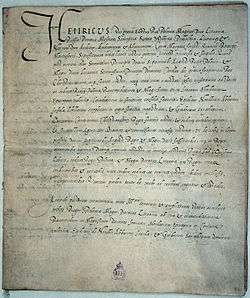Pacta conventa

Pacta conventa (Latin for "articles of agreement") was a contractual agreement, from 1573 to 1764 entered into between the "Polish nation" (i.e., the szlachta (nobility) of the Polish-Lithuanian Commonwealth) and a newly elected king upon his "free election" (wolna elekcja) to the throne.[1][2]
The document was drawn up by the convocation sejm.[3] The pacta conventa affirmed the king-elect's pledge to respect the laws of the Commonwealth and specified his undertakings and promises in such realms as foreign policy, taxes, public debt, the military, and so on.[2] They varied from king to king, depending on whatever particular pledges he might have made.[2] An example of the various concrete undertakings found in a king-elect's pacta conventa is King Władysław IV Vasa's pledge to create a Polish-Lithuanian Commonwealth Navy for the Baltic Sea.
In addition to his own unique pacta conventa, each king-elect was required to sign the Henrician Articles, a set of privileges named after the first king who signed them, Henry of Poland.[2] Unlike the pacta conventa, the Henrician Articles were constant and unchanging.[2] The distinction between the two documents gradually faded away over successive elections. Together, those two documents spelled out most of the key details of the Commonwealth political system.[2]
See also
Notes
- ↑ Corwin, Edward Henry Lewinski (1917) The political History of Poland Polish Book Importing Company, New York, page 195, OCLC 626738
- 1 2 3 4 5 6 Juliusz Bardach, Bogusław Leśnodorski and Michał Pietrzak, Historia państwa i prawa polskiego (History of the Polish State and Law), Warsaw, Państwowe Wydawnictwo Naukowe, 1987, pp. 216–7.
- ↑ Jacek Jędruch (1998). Constitutions, elections, and legislatures of Poland, 1493–1977: a guide to their history. EJJ Books. p. 74. ISBN 978-0-7818-0637-4. Retrieved 13 August 2011.